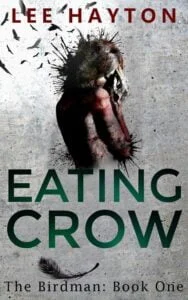While one of the great joys of being an indie authors is that you call the shots for your self-published book – you don't have to conform with the norms of trade publishing companies – this doesn't mean you should disregard what works for them. Rather, keep an eye on publishing trends, pick up on the trade's tips and tricks, and then make your own informed decisions about how you operate.
New Zealander novelist Katherine Hayton came across a fascinating new way to compare the manuscript of her next novel, Eating Crows, with bestsellers in her target gene. She is now empowered to try to move her book closer to trade norms, if she wishes to – or disregard them if she prefers to walk to the beat of her different drum (assuming that it is any different at all, that is!) Below she describes her experience of using SCARE, which technophobes might consider an appropriate product name! It's currently still in beta testing, but we'll let you know when it's available commercially.
Are you SCAREd yet?
For a while now, I’ve been using a variety of different software editing programs to help me pinpoint weaknesses in my text. Having been educated during the seventies, my teachers were of the generation where self-expression was very important, and rules could be safely ignored. Damn hippies. Most of the information I now know about writing came from osmosis from excessive reading, advice and corrections from editors, and reviews (ouch) from readers.
So when I heard a podcast about a new analysis method, SCARE, offering in-depth data analysis of manuscripts compared to bestsellers in their genre, I was immediately intrigued. And when I say immediately, I mean I hunted them down and sent off an excerpt within a few hours.
What does it do?
SCARE takes your manuscript, from concepts or chapter segments through to completed full-length manuscripts, and runs the analysis using a blend of existing books, sales data, sentiment analysis (aka opinion mining), and trending data, to highlight differences between your manuscript and successful sales examples within your genre.
The scale of data it uses is enormous. My chapter segment was analyzed using over 325,000 books in my genre, over 2300GB of sales data collected over 6.5 years, and more than 600 sentiment analysis sources.
The sentiment analysis also means that a plot point involving mass shootings in gay nightclubs may provoke different developmental notes now, compared with last year.
The report is divided into sections with each looking at a different aspect of writing. These cover many things from syntax and grammar, through to world building and audience appeal. Each section highlights differences between your submission and their data, and may use examples from within your text to highlight errors or points of difference. The SCARE Matrix – no, I’m not making this up – gives a summary of where the author can focus attention on developing the manuscript into a closer fit with successful fiction or non-fiction titles. For full manuscript submissions, they’ll also analyze your product description and cover.
What is it for?
SCARE helps you tailor your craft so you can sell more copies of your work. The main focus of the SCARE report is how to develop your work in specific areas to fit more closely with your intended genre, using high sales that generate positive reader experiences as a guide. The report is akin to a developmental editor with an intense focus on writing a best-seller.
If you’re looking for advice on craft or writing solely as a form of self-expression through art, this report probably won’t help. There are also no line-by-line tracked changes for you to accept or reject. Any changes made are at your sole discretion using your own abilities.
The story so far
To date, I’ve only submitted for analysis a first chapter segment from my current WIP, Eating Crows. The report I received highlighted issues that I’ve kept in mind while drafting the remainder of the novel. Once it’s finished, I plan on submitting the entire manuscript and purchasing a subscription (an add-on that allows you to submit up to once a day for a month, to check your edits head in the right direction) and give it a really good whirl.
Who knows? I may end up with a statistically-more-likely-to-be-bestselling book yet.
So, over to you. Are you like me and think this is a wonderful new opportunity, or do you think we should run for the bunker because the Rise of the Machines is just around the corner?
- Extra material available exclusively to ALLi members: Katherine has kindly agreed to share her SCARE chapter submission and report privately – we're putting the link on the ALLi Facebook forum, a members-only privilege. (If you're interested in joining ALLi to take advantage of this and many other exclusive services, discounts and deals, visit our membership website: www.allianceindependentauthors.org.)
RELATED POST – A handy round-up of other writing software







Took a look at SCARE, which is commercially available for both fiction and non-fiction; and at USD2,000 for the initial manuscript analysis of one manuscript, then a montlhy subscription of USD400 per month thereafter for only that book, I’m going to pass. Sorry, IMHO, paying that sort of money for a computer generated analysis against who-knows-what doing it God-knows-how (and He’s not telling), is plain foolish. We write for PEOPLE, not machines and their sterile analysis. No thanks. I’ll keep studying writing craft, and reading the works of writers who write in my genre, and grow my storytelling/writing skills organically.
Katherine, I just wanted to compliment you on your author bio. It really resonated with me. (49, works in insurance, no children or pets, lives within 6 miles of where she was born.)
This blogpost raises, again, the question of ‘indie writer’ identity. It’s fine if all you want to do is write – and you are happy and competent writing any genre which is currently ‘selling’ or at least to any moral code or ways of thinking which are currently ‘selling’.
If you publish independently because you kind of think and write independently, and you are writing because you have ideas, not because you like doing the hard work of putting a novel together and it matters not the plot, theme, genre, whatever … then this is not what you want …indeed it verges of anathema – why run after the trends, panting away at the back of the group – following along the already-bestselling bestsellers of the latest idea?
So, yes, there is more than one meaning of ‘indie writers’ …
Looking for this service online – googled SCARE, automated writing analysis, etc., and cannot find even one link. SCARE must be the name of the program sold/put out by a differently-named outfit? Can you post a link, please? Thanks!
Sorry, Diana, but as stated at the end of the second paragraph of this post, SCARE isn’t yet commercially available, but we’ll post the link as soon as it is.
The website is http://sil-creativesense.com. There are different applications of SCARE (semantic characterization analysis and rendering evaluation) available commercially that this time.
My reaction to this is that SCARE will help indie writers to sound just like commercially published writers. If this is the writer’s aim, the approach should do wonders. If the writer is in fact as well as in name “independent,’ s/he will probably not be interested.
I would like to recommend to indie writers a regular feature at Writer Unboxed, a useful website for writers. Each month at Writer Unboxed, Ray Rhamey offers a feature called “Flog a Pro.” Rhamey posts the opening page of a NYTimes bestseller, and invites people to vote yes or no as to whether they’d be interested in turning the page. More often than not, the answer is no. Doing this is useful for obscure writers: it serves to demonstrate how often “bestsellers” have been made so strictly through the use of “guerilla marketing”–using big-name authors to blurb the book, clever marketing, etc.
Sounds like it might do developmental editors out of a job! But then can a program really take the place of a human being? Only a person can make the judgement as to whether the program’s suggestions are actually going to help the author communicate what they want, and authors will always need another person to help them make that decision. We are just too close to the work. If you want to write a best seller, then it sounds like it will be helpful – depending on the price. I’d probably view it as another beta reader and take the suggestions as I would anyone’s opinion.